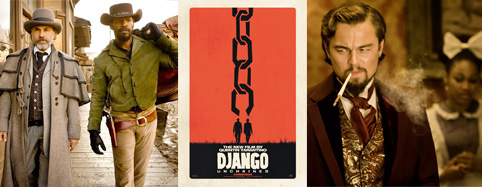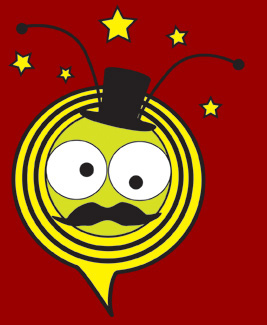
 D
DAlthough I loved the first two hours of Django Unchained, the film was ultimately a disappointment. A witty, tense blaxploitation western revenge story set in 1858, the film follows newly freed slave Django (Jamie Foxx) and remorseless bounty hunter Dr. King Schultz (Christoph Waltz) as they hunt down vicious rednecks. The impetus for Django's actions is the pursuit of his wife, from whom he was separated when they were each sold to different slave owners. The motivation for Dr. King Schultz appears to be the simple joy of killing cruel bastards. He just can't help himself. In fact, a scene where he displays his inability to control his trigger finger is the start of everything that caused my feelings about this movie to shift nearly instantaneously. The last 45 minutes of this movie go full Tarantino, with gallons of blood and exploding bodies everywhere. The last scene of Django Unchained is satisfying, but unfortunately the final scenes leading up to it had already done away with my good will.
There's some great comedy in the movie, the best bits involving a big ole wobbly molar and a band of hillbillies concerned with the practicality of their hate masks. As in Inglourious Basterds, Waltz is delightfully sadistic. One wishes he could never be off-screen. Leonardo DiCaprio is gleefully terrifying as a Mississippi plantation owner with some sweet fashion sense. And Samuel L. Jackson is mesmerizing as a house slave with an unsettling loyalty to his master.
5/10 Z
ZDjango Unchained is a long form music video about how cool seeking reparations can be in 19th century America if you're a former slave looking for his wife, and you're accompanied by a German immigrant posing as a dentist. Quentin Tarantino directed it, but I've got a good feeling you could have figured that one out for yourself. In fact, without saying another word about this movie, I'm pretty sure you've got it all figured out.
Quentin Tarantino has really come into his own as of late, and Django certainly doesn't indicate a step in the wrong direction. However, the film isn't really taking a step in the right direction either, as it more or less sidesteps and covers ground that was already covered quite well in Inglourious Basterds. Once again, we're presented with a group of people wronged who must ultimately band together to fight pure evil. In Inglourious Basterds, this pure evil is represented by Hitler, in Django Unchained, we get a wealthy landowner played by Leonardo DiCaprio and his senior house slave played by Samuel L. Jackson (who looks as if he's got lathered shampoo behind his ears). DiCaprio is awesome in his role, displaying a comedic side we rarely see in the roles that he plays, as well as a violent intensity that he often displays and is significantly less interesting. In Basterds, we get a montage scored by David Bowie, and in Django, we get one scored by James Brown & Tupac.
Although the acting in the film is excellent across the board, Django Unchained is rather overlong and often spends too much time overdeveloping what is pretty much a predictable Tarantino genre film. While other people around me were audibly surprised by several turns the film took, I generally found myself one step ahead in this feast of supporting talent. While it's true that my expectations were about as big as the tooth on top of Christoph Waltz's dentist truck, I ultimately felt that the movie was about as loose as the ribbons on Jamie Foxx's turquoise valet suit.
7/10 B
BDjango Unchained is a wildly entertaining romp about a slave named Django who is liberated by a German bounty hunter during the years just before the American Civil War. Together they kill criminals for cash and ultimately seek out Django's enslaved wife Hildy. Like Tarantino's previous film, Inglourious Basterds, this is a bloody revenge fantasy that satiates a desire to correct historical injustices. Overall, this film is exactly what you would expect from a Tarantino film: brilliant elegant dialogue that often builds suspense, gratuitous violence, and dark comedy.
Christoph Waltz gives another charming and humorous performance reminiscent of his role in Inglourious Basterds. Samuel L. Jackson is another highlight of the film, and is brilliant as a cowardly villainous master slave who we love to hate.
I am personally not a fan of the 70s film style and music that is inserted in various scenes. These showy directing choices don't seem to fit with the rest of the film nor do they seem to serve any purpose. Furthermore, Tarantino seems to drop the ball on one of the most intriguing characters in the film: a mysterious female masked behind a red bandana who is focused on conspicuously in a couple of scenes, then never explained. This haphazard impulsive directing is what makes a Tarantino film captivate yet fall just short of greatness.
8/10
